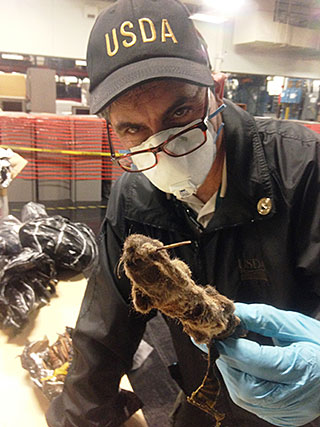
Generally, we must clear all wildlife (including parts and products) imported into the United States. This prevents the importation of wildlife taken illegally as well as wildlife dangerous to our native ecosystems. The Centers for Disease Control and Prevention (CDC) also looks at the importation of wildlife but focuses on wildlife capable of causing human disease.
The two frequently work together at U.S. ports of entry, and in December 2014, Fernando Gattorno, Special Agent with the Service’s Southeast Region, helped intercept about $200,000 worth of dried rats on sticks. They were shipped from Nigeria to South Florida for ceremonial use by people seeking help with spiritual and health problems, but CDC has banned most importations of live or dead African rodents ever since they were connected to an outbreak of monkeypox in the United States in 2003.
Besides CDC, Gattorno worked with the U.S. Department of Agriculture (USDA) and Florida Department of Health for guidance on how to safely handle hundreds of Gambian pouched rats, called oketes, and other items.
The shipment of dead rats on sticks in a cardboard box initially shut down the West Palm Beach post office and attracted a bomb squad and hazardous materials team. A postal worker had noticed a bad smell coming from a leaky package bound for a local artifacts importer’s store. This was at the height of the Ebola crisis, so the U.S. Postal Service was taking precautions, wearing face masks and gloves handling the package. Postal Service police alerted USDA, which regulates agricultural items coming into the United States — in this case, the wooden sticks that held the dried rats.
“I called Fernando knowing there were also animals involved,” says USDA’s Louis Volpe. “Fernando and I are friends. We fish together. I said, ‘Hey, we’ve got something you might be interested in.’ ”
The oketes, other African rodents and rodent pieces weren’t the only problem.
“To add insult to injury, in one of the four boxes, there were a whole bunch of wild bird feathers with blood on their tips, which was a big deal because of the potential for avian flu,” Gattorno recalls.
Gattorno called CDC’s Miami Quarantine Station for advice on personal protection. Emily Davenport, a quarantine public health officer, took the call. “Because this was during the Ebola crisis and the package was coming from West Africa, people were on edge and being extra vigilant,” Davenport says. “We told them to follow their normal personal protective equipment protocol. The way they handled these regulated items was outstanding.”
Davenport praises Gattorno for his quick work and calm, cool demeanor, and for calling CDC. “Agent Gattorno and the rest of the Service’s team are really great. Their work helps us prevent diseases from entering the country.”
Gattorno and his Service colleagues and port partners met with the artifacts importer and his interpreter. They fined the importer and educated him about U.S. laws, explaining why rats, bird feathers and wooden items are regulated, and how to process items to avoid disease and to comply with regulations. Their efforts seem to have worked. “We haven’t had a problem since to my knowledge,” says Gattorno.
[Published in Fish and Wildlife News, October 4, 2016]
